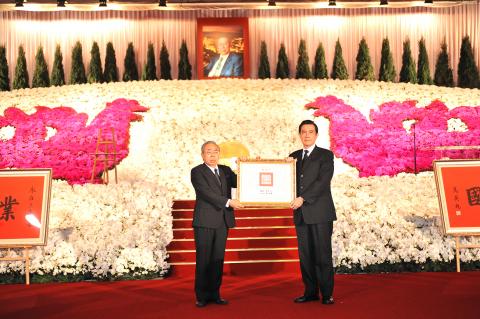Formosa Plastics Group (FPG, 台塑集團) yesterday held a funeral for cofounder Wang Yung-tsai (王永在), that drew many key political and business figures.
President Ma Ying-jeou (馬英九) made a statement praising Wang for building the group’s production base in Yunlin County’s Mailiao Township (麥寮), which helped boost the nation’s petrochemical industry, generate tax income and create jobs.
Vice President Wu Den-yih (吳敦義), Legislative Speaker Wang Jin-pyng (王金平) and Minister of Economic Affairs John Deng (鄧振中) attended the ceremony, as well as Democratic Progressive Party (DPP) caucus whip Ker Chien- ming (柯建銘) and former DPP chairman Su Tseng-chang (蘇貞昌).

Photo courtesy of Formosa Plastics Group
Wang passed away on Nov. 27. at the age of 93. He was a younger brother of Wang Yung-ching (王永慶), the other founder of the group. The younger Wang was dubbed “the grand architect” of the group’s production site in Mailiao — which encompasses the nation’s sixth naphtha cracker, an oil factory, a power plant and a harbor — because he supervised its construction, which started in 1994, according to the group.
“Wang [Yung-tsai] was a person who always quietly finished what had to be done and never asked for fame,” Chinese National Federation of Industries (CNFI, 全國工業總會) chairman Rock Hsu (許勝雄) said.
HTC Corp (宏達電) chairwoman Cher Wang (王雪紅), a niece Wang Yung-tsai, said that he devoted all his life to Taiwan and to the group, and his diligence is worth emulating.
Formosa Plastics Group chairman William Wong (王文淵), Wang Yung-tsai’s son, said he learned how to run a company from his father, who used to spend several hours at weekends discussing corporate management with Wong, and sharing his experience restructuring Formosa Chemicals & Fibre Corp (台灣化學纖維) and Nan Ya Plastics Corp (南亞塑膠).
Wong said he would live up to his father’s expectations and complete all of the group’s important projects.

Intel Corp chief executive officer Lip-Bu Tan (陳立武) is expected to meet with Taiwanese suppliers next month in conjunction with the opening of the Computex Taipei trade show, supply chain sources said on Monday. The visit, the first for Tan to Taiwan since assuming his new post last month, would be aimed at enhancing Intel’s ties with suppliers in Taiwan as he attempts to help turn around the struggling US chipmaker, the sources said. Tan is to hold a banquet to celebrate Intel’s 40-year presence in Taiwan before Computex opens on May 20 and invite dozens of Taiwanese suppliers to exchange views

Application-specific integrated circuit designer Faraday Technology Corp (智原) yesterday said that although revenue this quarter would decline 30 percent from last quarter, it retained its full-year forecast of revenue growth of 100 percent. The company attributed the quarterly drop to a slowdown in customers’ production of chips using Faraday’s advanced packaging technology. The company is still confident about its revenue growth this year, given its strong “design-win” — or the projects it won to help customers design their chips, Faraday president Steve Wang (王國雍) told an online earnings conference. “The design-win this year is better than we expected. We believe we will win

Chizuko Kimura has become the first female sushi chef in the world to win a Michelin star, fulfilling a promise she made to her dying husband to continue his legacy. The 54-year-old Japanese chef regained the Michelin star her late husband, Shunei Kimura, won three years ago for their Sushi Shunei restaurant in Paris. For Shunei Kimura, the star was a dream come true. However, the joy was short-lived. He died from cancer just three months later in June 2022. He was 65. The following year, the restaurant in the heart of Montmartre lost its star rating. Chizuko Kimura insisted that the new star is still down

While China’s leaders use their economic and political might to fight US President Donald Trump’s trade war “to the end,” its army of social media soldiers are embarking on a more humorous campaign online. Trump’s tariff blitz has seen Washington and Beijing impose eye-watering duties on imports from the other, fanning a standoff between the economic superpowers that has sparked global recession fears and sent markets into a tailspin. Trump says his policy is a response to years of being “ripped off” by other countries and aims to bring manufacturing to the US, forcing companies to employ US workers. However, China’s online warriors